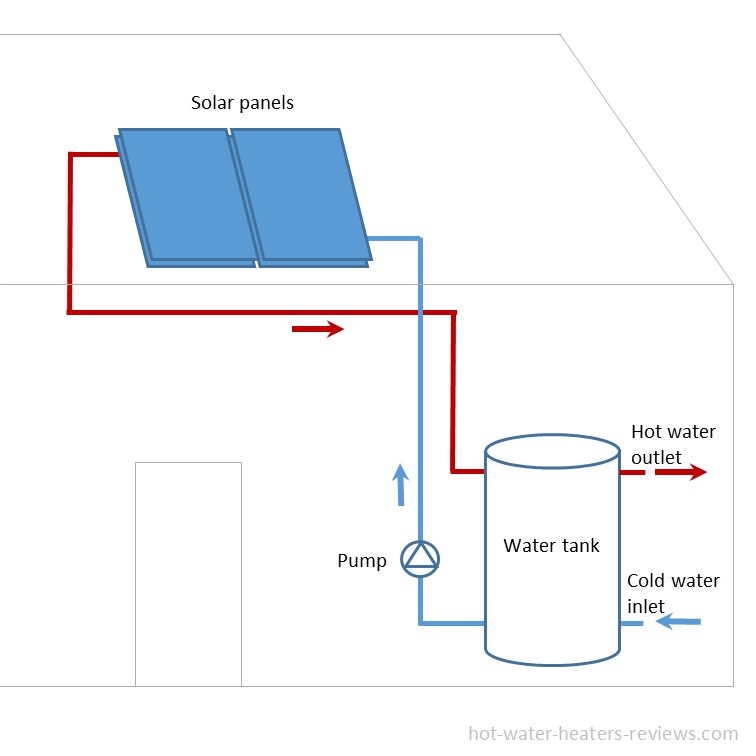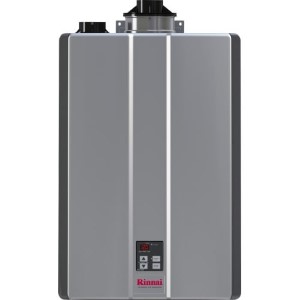- Home
- Heat Pump Water Heaters (Hybrids) Review
- Hybrid vs. Solar Water Heater
Hybrid vs. Solar Water Heater
Which System is Better?
Comparing hybrid vs. solar water heaters to get the most energy-efficient and cost-effective solution for your home water heating. Find out how they work, about advantages, disadvantages, and costs.
What are the options, and what makes the most sense for your water heating needs?
If you want to reduce using natural gas, propane, and electricity, lower your costs and protect the environment, consider installing one of the two popular water heating systems – hybrid and solar. Or, both. They provide many benefits and often come with substantial rebates and tax incentives.
What is hybrid water heating, and how it works?
 Heat pump
Heat pumpHybrid water heaters or electric heat pumps are devices that heat water using electricity and heat pump technology, solo or combined.
They use much less electricity than the standard electric type but produce hot water with an efficiency of 3-4 times higher, or even more when compared to gas-powered water heaters.
Hybrids work like refrigerators but in reverse. They don't generate heat but move it from one place to another, and at the same time, dehumidify the room where installed.
Heat is extracted from the surrounding air to heat the refrigerant. Heated refrigerant then goes through the compressor, increasing the temperature even more. From the compressor, it goes through the condenser coils, where it transfers the heat to the surrounding water.
Hybrids are recommended mostly for areas with milder climates so they can regularly use the heat pump and provide hot water with the highest efficiency. Newer models are also designed to work with low outdoor temperatures, but the efficiency is low. While the hybrid is heating water, it also cools and dehumidifies the surrounding air, making the space more comfortable during the hot weather.
Advantages of installing a hybrid water heater
- Popular sizes are available. Hybrids are usually built in sizes from 50 to 80 gallons, which is sufficient for households with up to 5 people.
- Except water heating, hybrids can also cool and dehumidify the surrounding air.
- Due to combine work of a heat pump and electric heating element, hybrids can heat water in any weather, with lower or higher efficiency.
- They usually come with 4-5 heating modes.
- Installation is as easy as when installing a typical electric water heater.
- As opposed to solar heating systems, heat pumps are designed for indoor installation only, where protected from the weather elements.
- They don't require any special maintenance.
- Decent lifespan of 10-15 years.
- Rebates and tax incentives are available.
Disadvantages
- Hybrids require a 220V circuit, so professional installation is required.
- They take more time to heat water.
- Hybrids depend on electricity, so there is no water heating during the blackouts.
- Hybrids are recommended for temperatures between 40 and 90 F.
- Hybrids are noisy as they use electric blowers.
How much does it cost to install a hybrid water heater?
New hybrid water heater installation costs range from $1200 to $4000 depending on the model and size, and it includes the unit and labor.
Hybrids are taller than the electric type of the same size, while the footprint is almost the same, including connections. That makes them as easy to install as the electric unit.
Due to the hybrid's ultra-efficient water heating, they are eligible for a tax credit. Use the Energy Star website to find rebates and special offers.
If you would like to see the prices for your area, fill out the form found on homeadvisor.com, and get up to 3 quotes from the local pros.
What is solar water heating, and how it works?
 Solar water heating
Solar water heatingIf you want to take advantage of the free and renewable solar energy for water heating, there are several options to consider.
You can choose between passive and active systems, direct and indirect, batch, thermosiphon, and drawback thermal systems, and get your hot water using the free and renewable thermal energy from the sun.
A typical solar water heater consists of a solar collector mounted on the roof, storage tank, circulation pump, and heat transfer fluid.
More advanced systems also utilize controllers, sensors, and other sophisticated elements. It all depends on your budget, location, installation feasibility, and other factors. Some types can be built by the DIY'ers, while more complicated ones would require professional installation.
Solar thermal systems often use water or antifreeze mixture that is running through the pipes inside the solar collector to collect heat directly from the sun. We also install circulation pumps to move the heated water from the panels to the hot water storage tank. With the solar thermal systems, you rely on the electric grid, because, during the cloudy days, wintertime, or nighttime, there is not enough sun to provide all the power necessary to heat the water, so we need a backup heater.
Also, you can go with the solar electric system using a photovoltaic or PV system to generate electricity and use it for electric water heating.
The advantage of the PV systems today is their affordable price and more flexibility when choosing the location for its installation. As opposed to solar thermal systems, photovoltaic systems wear out less as they don't have any moving parts and are not prone to freezing. They also require more roof space exposed to the sun.
Pair your PV system with the hybrid water heater and get free energy and ultra-efficient water heating without relying on the electric grid.
Solar heating systems have the highest efficiency when exposed directly to the sun. The efficiency greatly depends on solar energy, so there is no heating in winter and during the nighttime, while during the cloudy days, the efficiency is significantly reduced.
Advantages of installing a solar water heater
- Free and renewable energy. Solar water heating systems do not depend on fossil fuels or electricity. They take energy directly from the sun.
- Solar water heaters usually have an electrical backup, or, if not, they can be easily combined with the gas or electric type.
- Various types are available.
- They can work without electricity.
- Solar water heaters can be made at home.
- Tend to pay for themselves well over time.
- Environment-friendly. No carbon footprint.
- Low maintenance if using antifreeze fluid and regularly inspected by a pro.
- Hot water is available during power outages.
- Rebates and tax incentives are available.
- They come with warranties of around 20-25 years, but can last longer.
Disadvantages
- Your comfort greatly depends on solar energy; there is no heating in winter and during the nighttime, while the efficiency is significantly reduced during cloudy days.
- High up-front cost (in terms of purchasing and installation).
- Its performance greatly depends on climate. It requires direct sunlight to function.
- As the solar collector is installed outdoors, it must be protected from the elements. They are prone to cracks and leaks due to freezing weather and various situations (storm, hail, tree branches, and rocks).
- It occupies the roof space, making the shingle replacement harder, costing you more. You might need several solar panels to meet the requirements.
How much does it cost to install a solar water heater?
Solar water heaters are not cheap. The initial price of equipment and installation costs vary from region to region, a contractor you choose, size, type, system configuration, and element quality.
For example, an Integral Collector-Storage (ICS) system is cheaper than the Thermosyphon type, while the batch type can be a nice and cheap DIY project if you know what to do and have the necessary tools.
According to homeadvisor.com, expect to pay between $3,000 and $4,000 as an average, or more for advanced models and setup. For this price, you would get a system with a tank size of up to 120 gallons to satisfy all the needs for hot water for up to 6 people.
In addition, there are some local and state rebate programs and tax incentives that can reduce your final cost significantly (20% and more). Check the energy.gov website to get more info about tax credits, requirements, and how to apply.
As we mentioned before, the most cost-effective water-heating option is to combine a PV solar panel with a heat pump. If you want to know how long it takes for solar panels to pay for themselves, check out a solar panel payback calculator found on the solarreviews.com website.
It is recommended to hire a professional for this kind of work and expect to pay around $70 per hour. Here, on HomeAdvisor.com, you can get up to 3 free estimates from your local experts.
So which to choose when upgrading your old water heater?
Since water heaters are the second-largest energy consumer in residential homes (around 18%), right after your home heating and cooling, buying a new efficient water heater, or replacing an old one, is the right move. Both hybrid and solar options we discussed here are attractive alternatives to traditional gas and electric water heaters.
Looking at the pros and cons of hybrid vs. solar water heaters and considering higher fuel rates today, we think that the best solution, also most affordable and clean, is the combination of photovoltaic panels and heat pumps. The PV panels would provide free energy, which will then be used to power the ultra-efficient heat pump. But, if you want to have hot water without electricity, passive solar thermal systems are another great option.
Related
Leave a Comment
- Home
- Heat Pump Water Heaters (Hybrids) Review
- Hybrid vs. Solar Water Heater


